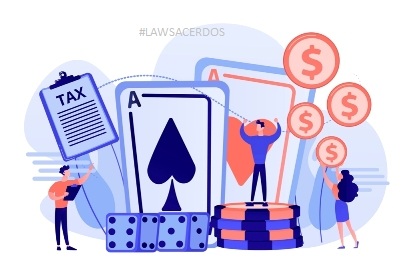 –by Amar Anshul
–by Amar Anshul
OVERVIEW
India, with a population of almost 1.4 billion, is one of the most interesting gambling markets for companies all over the world as they see a huge potential for placing their products. Also, thanks to their British heritage, Indians are very open to gambling as a pastime activity. Whether it is horse racing betting or gambling online at the reviewed casino sites, Indians are ready to feel the thrill of a good bet.
‘Gambling’ is not defined under the Gambling Legislations. The dictionary meaning of gambling is “to stake something on a contingency; take a chance”. The gambling under the Gambling Legislations does not include
(i) betting on a horse race (subject to the legal regulations);
(ii) games of skill (excluded under the Gambling Act and by the court’s judgments); and
(iii) lotteries (regulated by lottery laws of India)
According to Economic Times, in 2013 30% of all plane passengers to Goa were gamblers, ready to spend their money in popular floating and land casinos. So, if Indians are ready to sit on a plane just to play in a casino, are there enough offers that live up to the ever-increasing demand?
Gambling regulation in India
The Public Gambling Act, 1867 (“Gambling Act”) is the general law governing gambling in India. However, the state legislatures, under the Constitution of India, have been entrusted with significant regulatory leeway to form state specific gambling laws. The Gambling Act is the central enactment which has been adopted by certain states in India and other states have enacted their own legislation to regulate and govern gaming/gambling activities within their territory (“Gambling Legislations”). Most of the Gambling Legislations have been enacted prior to the advent of virtual or online gambling and hence these Gambling Legislations primarily refer to gaming/gambling activities at the physical premises.
Regardless of the mounting popularity and the revenue generated by gambling and betting in India, the Indian laws and the Courts in India have been averse to any game of chance and probability, except in States of Goa and Sikkim. Since the advent of British rule, many Indian states have enforced the Gambling Act prohibiting all forms of gambling and betting in their respective states. Goa and Sikkim are the only exceptions which have allowed gambling and betting in their state, subject to regulation of their respective state Governments. List II of Seventh Schedule of the Indian Constitution, endows the state Governments with the power to legislate on matters concerning gambling and betting. India continues to enforce the pre-independent gambling legislations enacted by the British rulers, but it is interesting to note that UK has changed its gambling laws by allowing almost all forms of gambling in UK in light of the changing societal norms of their country.
According to research conducted by PlayWin, a Sikkim-owned lottery, India will be losing more than $1.5 billion in taxes annually just because they are ignoring the online casino industry. The entire economy is also losing money as they are missing out on providing additional services to offshore gambling companies like marketing activities, special events, customer support, etc., while other countries, like Malta, managed to make gambling industry a major part of their local economy.
In State of Andhra Pradesh v K. Satyanarayana and Ors[1] ,the Court held that:
“The game of Rummy is not a game entirely of chance like the ‘three-card’ game mentioned in the Madras case to which we were referred. The ‘three card’ game which goes under different names such a ‘flush’, ‘brag’ etc. is a game of pure chance. Rummy, on the other hand, requires certain amount of skill because the fall of the cards has to be memorised and the building up of Rummy requires considerable skill in holding and discarding cards. We cannot, therefore, say that the game of Rummy is a game of entire chance. It is mainly and preponderantly a game of skill. The chance in Rummy is of the same character as the chance in a deal at a game of bridge.”
In ManoranjithamManamyilMandram v State of Tamil Nadu[2], the Court held that:
“Therefore, while it is the right of the appellant to have recreational activities which are not prohibited, the respondent’s right to take appropriate proceedings against illegal games of betting, wagering, etc. is also provided for under the Act. Therefore, there cannot be a blanket direction as prayed for by the appellant. The question whether a particular game is a game of skill or chance is to be decided on the facts and circumstances of each case. As and when proceedings are; initiated against the appellant in accordance with law, the appellant shall always have the right to question the same or challenge the action of the respondents if it is not in accordance with law.”
The Gambling Act, by virtue of Section 12, excludes ‘game of skill’ from the purview of law. Supreme Court in the case of Dr. R. K. Lakshmanan v. State of Tamil Nadu[3] defined ‘game of skill’ as “one in which success depends principally upon the superior knowledge, training, attention, experience and adroitness of the player”. The Court pointed out that a game of chance is one in which the element of chance predominates over the element of skill and similarly a game of skill is one in which the element of skill predominates over the element of chance. It is the dominant element – “skill” or “chance” that determines the true character of the game.
LEGAL POSITION OF ONLINE GAMING/GAMBLING IN INDIA
Online Gaming/Gambling laws in India prohibit betting or wagering and any act which is intended to aid or facilitate the same. Gaming/Gambling being a State subject, gaming/gambling in India have laws which differ from state to state . This would mean what is permitted in one State may be an offence in another. The Public Gambling Act, 1867, is the central enactment on the subject, which has been adopted by certain states of India like Uttar Pradesh, Punjab, Madhya Pradesh etc. The other States have enacted their own legislation to regulate gaming / gambling in India activities within its territory. It is to be noted that State Legislations have been enacted prior to the advent of virtual / online gambling in India and therefore references of gaming/gambling in India, in respective state legislatures are in relation to physical premises only, barring Sikkim and Nagaland which are the only States who have introduced regulations pertaining the online gaming. Online Gaming/Gambling laws in India prohibit betting or wagering and any act which is intended to aid or facilitate the same. Gaming/Gambling being a State subject, gaming/gambling in India have laws which differ from state to state . This would mean what is permitted in one State may be an offence in another. The Public Gambling Act, 1867, is the central enactment on the subject, which has been adopted by certain states of India like Uttar Pradesh, Punjab, Madhya Pradesh etc. The other States have enacted their own legislation to regulate gaming / gambling in India activities within its territory. It is to be noted that State Legislations have been enacted prior to the advent of virtual / online gambling in India and therefore references of gaming/gambling in India, in respective state legislatures are in relation to physical premises only, barring Sikkim and Nagaland which are the only States who have introduced regulations pertaining the online gaming.
The question is, how long can India ignore the thriving online casino industry? Of course, there is a high chance that authorities consider the entire business sector to be devastating for society, but that won’t prevent people from gambling. Remember, during festivities such as Holi, gambling activities increase up to 40%, and they mostly take place in illegal and improvised casinos. Gambling and betting are as old as mankind, and no regulations can prevent people from having fun.
It can be expected that sooner or later, India will have to follow the footsteps of Italy and the United Kingdom and focus on licensing online casinos, not only because it can make a significant part of the state’s budget, but also to protect customers and provide an efficient regulatory framework. As many online casinos offer sports betting as well, we can hope to see this market segment being more efficiently legalized and not focused exclusively on horse racing, as there are many other sports interesting to Indian punters.
Conclusion
The gambling laws in India continue to be confusing and unclear. The judiciary time again through various decided case laws have tried to clear the air and provide clarity on the subject. However, the recent technological changes have thrown open the sector and have allowed the masses to participate in activities which lie in the border line of gambling laws in India. These activities are yet to be scrutinized and tested through the courts in India. It is advisable that before someone ventures into any gambling activity in India, he/she may take a sound legal advice in respect of the same so as to avoid any unnecessary legal implications.
[1]AIR 1968 SC 825
[2][AIR 2005 MAD 261]
[3][AIR 1996 SC 1153]

